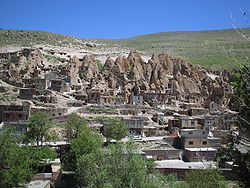Kandovan
كندوان | |
|---|---|
Village | |
 A view of Kandovan's rock houses | |
| Coordinates: 37°47′42″N 46°14′55″E / 37.79500°N 46.24861°E | |
| Country | |
| Province | East Azerbaijan |
| County | Osku |
| Bakhsh | Central |
| Rural District | Sahand |
| Population (2006) | |
• Total | 601 |
| Time zone | UTC+3:30 (IRST) |
| • Summer (DST) | UTC+4:30 (IRDT) |
Kandovan (Persian: كندوان, also romanized as Kandovān and Kandavān; also known as Kanvān)[1] is an ancient village in Sahand Rural District in the Central District of Osku County, East Azerbaijan Province, northwestern Iran. It is situated in the foothills of Mount Sahand, near the city of Osku. At the 2006 census, the village population was 601, in 168 families.[2]
The village exemplifies manmade cliff dwellings which are still inhabited. The troglodyte homes, excavated inside volcanic rocks similar to dwellings in the Turkish region of Cappadocia, are locally called Karaan.[3] Karaans were cut into non-welded ignimbrites, also called "ash-flow tuffs," of Mount Sahand. The cone form of the houses is the result of the erosion of ignimbrite layers consisting of porous, round and angular pumice together with other volcanic particles that were positioned in a grey, acidic matrix. During the eruption of Sahand, pyroclastic flows formed the rocks of Kandovan. Around the village the thickness of this formation exceeds 100 metres (330 ft) and with time, due to water erosion, the cone-shaped cliffs were formed.[4]
- ^ Kandavan can be found at GEOnet Names Server, at this link, by opening the Advanced Search box, entering "-3813310" in the "Unique Feature Id" form, and clicking on "Search Database".
- ^ "Census of the Islamic Republic of Iran, 1385 (2006)" (Excel). Statistical Center of Iran. Archived from the original on 2011-09-20.
- ^ Hashemi, S., 2013. The Magnificence of Civilization in Depths of Ground (A Review of Underground Structures in Iran – Past to Present), Shadrang Printing and Publishing Co., Tehran.
- ^ Kaljahi, E.A., Birami, F.A. and Hajialilue, M., 2015. Influence of Geological Structures and Weathering in Formation and Destruction of Cone-Shaped Rocky Houses of the Kandovan Village, Iran. In Engineering Geology for Society and Territory-Volume 8 (pp. 231-234). Springer, Cham.
